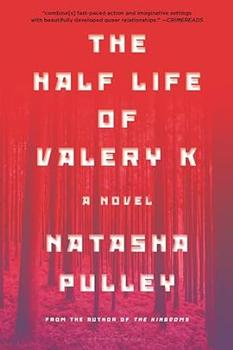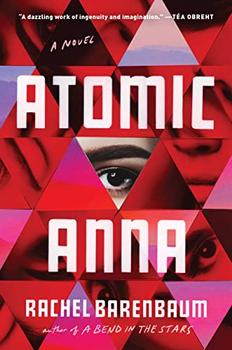Summary | Excerpt | Reviews | Beyond the book | Read-Alikes | Genres & Themes | Author Bio

"All that is solid melts into air, all that is holy is profaned, and man is at last compelled to face with sober senses, his real conditions of life, and his relations with his kind." These famous lines from the Communist Manifesto are widely considered a sendup of the principles of capitalism, a forecast of the belief that a way of life built on capturing ever new markets can never be sustainable and will eventually collapse. The irony in All That is Solid Melts Into Air, Darragh McKeon's brilliant debut novel, is that it positions the theory at a new angle, back at the Soviet Union, and succeeds in driving home the point that any society where its citizens' wishes are quashed in pursuit of a larger goal is one that fosters Marx's terrifying nightmare.
Using the Chernobyl disaster (see Beyond the Book) as a compelling backdrop, McKeon explores life behind the Iron Curtain in the late 80s and 90s when, despite the early promise of Glasnost, nothing much changes for the average Russian citizen. A primary set of characters orbit around each other, their paths occasionally intersecting in interesting ways: Maria Nikolaevna used to be a Moscow journalist before a frank airing of opinions got her into trouble. These days she works a production line at a Moscow factory, barely bringing in enough to pay rent for the apartment she shares with her sister Alina, a laundress. Alina's son, Yevgeny, a child who shows plenty of promise at the piano, might yet win a scholarship at the music conservatory. And Maria's ex-husband, Grigory Ivanovich Brovkin, is a doctor at a local Moscow hospital. He is one of the first sent to the "front" when the Chernobyl disaster unfolds.
The accident triggers a communique from the Chairman of the Council of Ministers. "For your information, there has been a fire reported in Reactor 4 of the Ukrainian nuclear-power plant, Chernobyl. The incident is under control but we have reports that the damage may be significant. However, I can reassure you that this incident will not stop the advance of nuclear energy." This clipped response masks the immense gravity of the tragedy that is slowly unspooling in one corner of the Soviet Union - where people are dying horrific deaths from exposure and its related side effects. Mckeon's descriptions of the fallout are memorable, not just for the pain he depicts so movingly, but for the fact that he does so without a hint of melodrama. What's even more unsettling is the knowledge that there's a cloud of suspicion and half-truths; that information is not being shared fully; that the enormous human costs of such a tragedy are largely being swept under the rug. The disaster was horrific of course, as McKeon underscores, but what's worse is that it was underwritten by many smaller tragedies that have been a systematic part of Russian life for decades. It is perhaps captured in the absolute numbness these characters feel in the wake of the accident - hesitant to ask questions, knowing they have limited options for refuge and feeling absolutely terrified of speaking up.
As Grigory tries his best to save lives in Chernobyl and nearby Pripyat, which houses the workers, it's heartbreaking to see his every effort come up empty-handed. "No officials have made their way here, despite his daily entreaties. He wants them to walk into this room, a place where ideology, political systems, hierarchy, dogma, are relegated to mere words, belonging to files, banished to some dusty office. There is no system of belief that can account for this. The medical staff know that, in comparison, nothing that has gone before in their lives has any significance. There are only these months, these rooms, these people."
Back in Moscow, inspired by Poland's Solidarity movement, Maria wants to galvanize her fellow factory workers into action but can't seem to stir the pot in secret; she is especially worried that her actions might have repercussions for her family members including Alina and Yevgeny.
The ending fast-forwards many years into the future and shows the path that each character's life eventually takes. Even if it is sometimes hard to make this leap from an amorphous present to a clearer future, All That is Solid is a brilliant peek behind the Iron Curtain - a perfect snapshot of a behemoth floundering before collapse. "Sometimes I hear these words, 'glasnost, 'perestroika,' and they sound to me like the final breaths of an empire," Maria says. The toxic clouds, it seems then, were hanging around long before Chernobyl ever came along.
![]() This review
first ran in the May 21, 2014
issue of BookBrowse Recommends.
This review
first ran in the May 21, 2014
issue of BookBrowse Recommends.

If you liked All That Is Solid Melts into Air, try these:

by Natasha Pulley
Published 2024
From the author of The Watchmaker of Filigree Street and The Kingdoms, an epic Cold War novel set in a mysterious town in Soviet Russia.

by Rachel Barenbaum
Published 2023
From the author of A Bend in the Stars, an epic adventure as three generations of women work together and travel through time to prevent the Chernobyl disaster and right the wrongs of their past.
Your guide toexceptional books
BookBrowse seeks out and recommends the best in contemporary fiction and nonfiction—books that not only engage and entertain but also deepen our understanding of ourselves and the world around us.